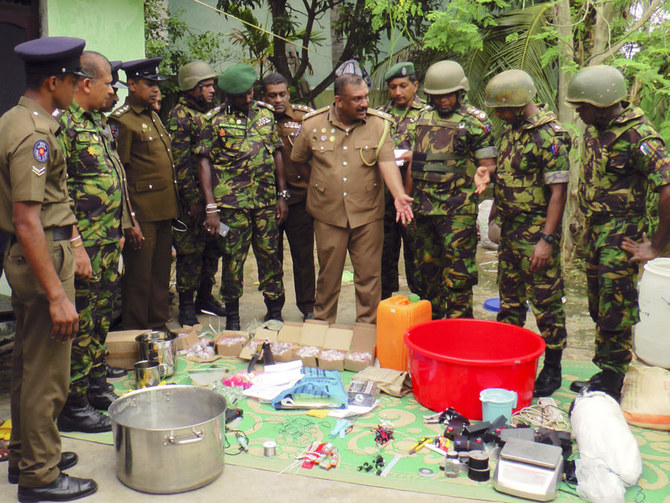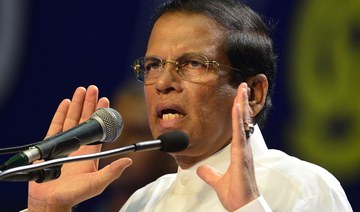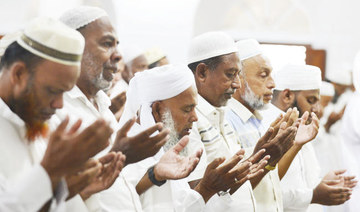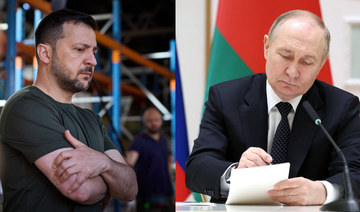COLOMBO, Sri Lanka: While monitoring the usual channels, Indian police stumbled upon something extraordinary: a detailed plot for what would become the bloodiest attack linked to the Daesh group in South Asia.
Police were investigating suspected sympathizers of the withered caliphate in southern India when a name they had no record of surfaced — National Towheed Jamaat, the Sri Lankan Daesh-backed militant organization that authorities say conducted the coordinated Easter Sunday attacks on churches and hotels in Sri Lanka that killed more than 250 people.
Indian police managed to break into the group’s communications and began tapping into the plot, according to Ajai Sahni, executive director of the Institute for Conflict Management in New Delhi.
“That is why the kind of detailing of the incident they received was very, very specific,” Sahni said. “They knew the group, they knew the targets, they knew the time, they knew the whereabouts of the suicide bombers, and all of this was communicated to the Sri Lankan government.”
Top Sri Lankan officials have acknowledged that some of the island nation’s intelligence units were given advance notice about the attacks — starting weeks ago and up until the morning of the bombings — but that little was done to prevent them.
Both President Maithripala Sirisena, who is also Sri Lanka’s minister of defense and in charge of national police, and Prime Minister Ranil Wickremesinghe, who has been kept out of high-level security meetings since Sirisena tried to oust him last fall, said they only learned about the plot after it had been carried out.
“The fact is, it’s very, very specific information and that has been conveyed to everyone in writing. That is the action that was missing in some cases. That’s what we’re investigating,” Wickremesinghe said.
The first intelligence brief from India arrived April 4, more than two weeks before the bombings. It said a suicide terrorist attack was planned against “some important churches” and listed six people likely to be involved.
The deputy inspector of police shared the report with at least four security unit directors, including those responsible for “VIPs” and foreign embassies, along with a memo, urging the directors to pay extra attention to the places and people in their care.
India’s final intelligence warning came just before the Easter morning blasts, Sahni said.
Why the warnings went unheeded is the subject of intense public debate, with some blaming the dismantling of a system built by former strongman President Mahinda Rajapaksa for rapid response to rebel activity during Sri Lanka’s long civil war.
For 26 years, the Tamil Tigers militants from Sri Lanka’s minority Tamil ethnic community fought for independence from the Buddhist, ethnically Sinhalese-majority state. Military forces under Rajapaksa’s brother, then-Secretary of Defense Gotabhaya Rajapaksa, brutally crushed them in 2009.
The current state minister of defense, Ruwan Wijewardene, said “weakness” within Sri Lanka’s security apparatus led to the failure to prevent the Easter bombings.
Sirisena, while campaigning for the 2015 election to defeat Rajapaksa, had stressed the need for fresh investigations of military officials, including intelligence officers accused of abducting and killing civilians, political opponents and journalists during the civil war.
Since then, some military officials have been arrested on charges related to their actions during the war and remanded in detention facilities. Court cases are ongoing.
But on Friday, Sirisena, perhaps with an eye toward the 2020 election, said that arresting military intelligence officials after the civil war had weakened national security. He promised a shake-up, asking for the resignations of both his secretary of defense and inspector general of police.
Some experts believe Sri Lankan security forces may not have given much credence to Indian intelligence because of its controversial role in the civil war.
India’s Research and Analysis Wing, or RAW, the country’s external intelligence group, initially supported Tamil separatists, training and arming the Liberation Tigers of Tamil Eelman in the 1970s. But after the group’s terrorist activities in the 1980s, RAW withdrew its support.
New Delhi made a pact with Colombo in 1987 to send peacekeeping forces to the island on its southern tip, and they ended up fighting the rebels. They were asked to withdraw a few years later amid allegations of abuses against Tamils. In 1991, Indian Prime Minister Rajiv Gandhi was assassinated by a Tamil Tiger suicide bomber.
India questioned Sri Lanka’s heavy-handed approach to defeating the Tigers in the final months of the war, when tens of thousands of civilians were reportedly killed by government troops. Thousands more are still missing. Ethnic minority Tamils in the country’s north and east are still reeling from the effects of the war.
Indian security and intelligence agencies lost some of their “moral authority” with the Sri Lankans, said M.K. Narayanan, the former head of India’s external intelligence service.
“What really happened was India lost moral authority. India did not accept the policies that were being followed, so they lost a lot of support in Sri Lanka,” he said.
Genealogical and cultural ties between Sri Lanka and India date back thousands of years. According to folklore, the island’s majority Sinhalese are descendants of an Indian prince banished there 2,000 years ago.
The nation’s minority Tamils, meanwhile, are in part the descendants of more than a million tea and rubber plantation workers brought to Sri Lanka from southern India by British colonial rulers in the 18th and 19th centuries.
And India shares intelligence with its neighbors in part to keep them within its sphere of influence, Narayanan said.
Located just 23 kilometers (14 miles) off its southeast coast, India sees Sri Lanka as a bulwark in its military defenses to ward off potential Chinese incursions. Soon after the Easter attacks, India deployed naval and coast guard ships along the narrow Palk Strait.
Indian police uncovered a plot, but Sri Lanka didn’t act
Indian police uncovered a plot, but Sri Lanka didn’t act

- India sent Sri Lanka's top security officials a detailed information that the National Towheed Jamaat terror group's terror plot
- Both President Sirisena and Prime Minister Wickremesinghe said they only learned about the plot after it had been carried out
Poland’s foreign minister says it should not exclude the possibility of sending troops to Ukraine

“We should not exclude any option. Let Putin be guessing as to what we will do”
WARSAW: Poland’s foreign minister says the NATO nation should not exclude the possibility of sending troops to Ukraine and should keep Russian President Vladimir Putin in suspense over whether such a decision would ever be made.
Radek Sikorski made the comments in an interview published Tuesday in the Gazeta Wyborcza daily.
“We should not exclude any option. Let Putin be guessing as to what we will do,” Sikorski said when asked whether he would send Polish troops to Ukraine.
Sikorski said he has gone to Ukraine with his family to deliver humanitarian aid.
But a spokesperson for Poland’s Defense Ministry, Janusz Sejmej, told Polish media on Tuesday he had “no knowledge of that” when asked about a report in Germany’s Der Spiegel magazine suggesting Poland might send troops to Ukraine.
The idea of sending foreign soldiers to Ukraine, which is battling Russian military aggression, was floated earlier this year in France, but no country, including Poland, has publicly embraced it.
Poland supports neighboring Ukraine politically and by providing military equipment and humanitarian aid.
Baby found dead in stricken migrant boat heading for Italy

- The infant girl, her mother and 4-year-old sister were in an unseaworthy boat laden with migrants that had set off from Sfax in Tunisia
- SOS Humanity workers aboard its “Humanity 1” vessel found many of the migrants exhausted
LAMPEDUSA, Italy: The body of a five-month-old baby was found on Tuesday when some 85 migrants heading for Italy from Tunisia were rescued from distress at sea, according to a Reuters witness.
The infant girl, her mother and 4-year-old sister were in an unseaworthy boat laden with migrants that had set off from Sfax in Tunisia two days earlier bound for Italy, according to charity group SOS Humanity.
SOS Humanity workers aboard its “Humanity 1” vessel found many of the migrants exhausted and suffering from seasickness and fuel burns as they were rescued before dawn on Tuesday, the group said in a statement.
Some 185 migrants rescued in separate operations this week, including the stricken boat overnight, were being taken aboard “Humanity 1” to the port of Livorno in northwest Italy. Another 120 migrants were transferred by coast guard boat to the Italian island of Lampedusa in the southern Mediterranean.
Tunisia is grappling with a migrant crisis and has replaced Libya as the main departure point for people fleeing poverty and conflict further south in Africa as well as the Middle East in hopes of a better life in Europe.
Italy has sought to curb migrant arrivals from Africa, making it harder charity ships to operate in the Mediterranean, limiting the number of rescues they can carry out and often forcing them to make huge detours to bring migrants ashore.
Putin says Ukraine should hold presidential election

- Zelensky has not faced an election despite the expiry of his term
MOSCOW: Russian President Vladimir Putin said on Tuesday Ukraine should hold a presidential election following the expiry of President Volodymyr Zelensky’s five-year term.
Zelensky has not faced an election despite the expiry of his term, something he and Kyiv’s allies deem the right decision in wartime. Putin said the only legitimate authority in Ukraine now was parliament, and that its head should be given power.
US cautions UK against censuring Iran over nuclear program: Report

- Britain, France expected to condemn Tehran in resolution at IAEA meeting
- Washington seeking to avoid Mideast escalation amid simmering tensions
LONDON: The US has warned the UK against condemning Iran’s nuclear program at a meeting of the International Atomic Energy Agency next week, the Daily Telegraph reported.
Amid simmering tensions in the Middle East and a US presidential election in November, Washington is reportedly seeking to avoid a regional escalation.
At an IAEA board of governors’ meeting next week, the UK and France are expected to deliver a censuring resolution against Iran over its nuclear program.
But the US is said to have warned other countries to abstain from the resolution, which was drafted over growing frustration with Tehran’s defiance of the IAEA.
Officials in the US have denied lobbying against the British and French move.
As well as electoral concerns, the White House also fears that Iran may be prone to instability following last month’s exchange of strikes with Israel, and the death of the country’s president and foreign minister in a helicopter crash.
UK officials believe that Iran’s nuclear program is as advanced as ever and are “deeply concerned” about escalation, the Daily Telegraph reported.
From June 3-7, the 35-member IAEA board of governors will gather for a quarterly meeting.
Iran is believed to have been enriching uranium to 60 percent purity for three years, following Washington’s axing of the nuclear deal under former President Donald Trump.
Tehran has maintained that it seeks to use the uranium for a civil nuclear program. But the IAEA has warned that no country has enriched to 60 percent purity without later developing nuclear weapons.
Last week, a senior European diplomat described Iranian nuclear violations as “unprecedented” in comments to Reuters.
“There is no slowing down of its programme and there is no real goodwill by Iran to cooperate with the IAEA,” the diplomat said. “All our indicators are flashing red.”
Danish parliament rejects proposal to recognize Palestinian state

- The Danish bill was first proposed in late February by four left-wing parties
- “We cannot recognize an independent Palestinian state, for the sole reason that the preconditions are not really there,” Foreign Minister Lars Lokke Rasmussen said
COPENHAGEN: Denmark’s parliament on Tuesday voted down a bill to recognize a Palestinian state, after the Danish foreign minister previously said the necessary preconditions for an independent country were lacking.
Ireland, Spain and Norway on Tuesday formally recognized a Palestinian state, after their announcement last week that they would do so angered Israel which called the move a “reward for terrorism” and recalled its ambassadors.
The Danish bill was first proposed in late February by four left-wing parties.
“We cannot recognize an independent Palestinian state, for the sole reason that the preconditions are not really there,” Foreign Minister Lars Lokke Rasmussen said when the bill was first debated in parliament in April.
“We cannot support this resolution, but we wish that there will come a day where we can,” Rasmussen, who was not present at the vote on Tuesday, added.
Denmark has, following Hamas’ Oct. 7 attack that triggered Israel’s military campaign in Gaza, said that Israel has a right to defend itself, but has more recently urged the country to show restraint and maintained it must respect international law.
Dublin, Madrid and Oslo have painted their decision as a move aimed at accelerating efforts to secure a ceasefire in Israel’s war with Hamas in Gaza, and have urged other countries to follow suit.





















